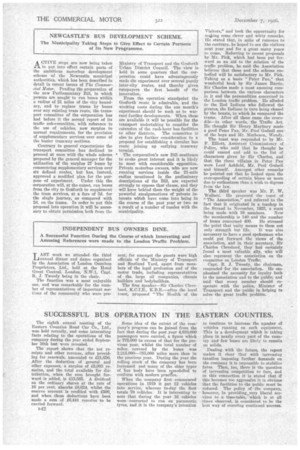SUCCESSFUL BUS OPERATION IN THE EASTERN COUNTIES.
Page 68

If you've noticed an error in this article please click here to report it so we can fix it.
The eighth annual meeting of the Eastern Counties Road Car Co., Ltd, was held recently, and some interesting facts relating to the operations of the company during the year ended September 30th last were revealed.
The report shows that the net receipts and other revenue, after providing for renewals, amounted to £21,656. After the deduction of general and other expenses, a surplus of £9,003 remains, and the total available for distribution, when the sum brought forward is added, is £15,565. A dividend on the ordinary shares at the rate of 10 per cent. absorbs £8,624, whilst the reserve account is credited with £500, and when these deductions have been made a sum of £6,441 remains to be carried forward. Some idea of the extent of the comliany's progress can he gained from the fact that during the past year 4,838,000 passengers were carried, a figure which is 775,000 in excess of that for the previous year, whilst the total number of miles covered by the buses was 2,215,000-385,000 miles more than in the previous year. During the year the rolling stock of the company has been increased and many of the older types of bus body hare been rsmodelled to conform with modern practice.
When the company first commenced operations in 1919 it put 12 vehicles into service, whereas to-day the fleet totals 70 vehicles. It is interesting to note that during the year 16 vehicles were converted to run on pneumatic tyres, and it is the company's intention to continue to increase the number of vehicles running on such equipment, This is a development which is taking place in nearly every part of the country and few buses are likely to remain on solids.
Dealing with the future, the report makes it clear that with increasing taxation imposing further demands on the company it is impossible to stabilize fares. Then, too, there is the question of increasing competition to face, and in this connection it is stated that if this becomes too aggressive it is obvious that the facilities to the public must be reduced. The policy of the company, however, in providing.very liberal services to a time-table, which is at all times observed, is considered to be the best way of ensuring continued success.




















































































































